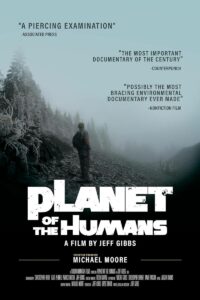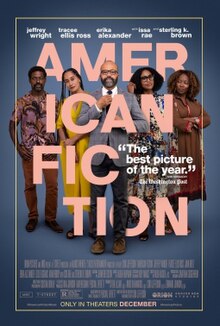This Week’s Selected Media: July 21, 2024: Planet of the Humans and American Fiction
This week I finished:

Planet of the Humans, written, directed, and produced by Jeff Gibbs, executive produced by Michael Moore: I watched this movie in 2020 when they released it on YouTube. I remember thinking that solar and wind might not be perfect, but they’re better than fossil fuels.
Before saying my reaction this time, I should mention after watching it this week, I read, watched, and listened to about a dozen reviews, articles, and interviews about the movie. At least a third were critical, such as having “debunked” in the title. Many researched the movie’s numbers.
In many details the movie seemed misleading. For example, pointing out the electric vehicle got power from the grid, but the grid got its power from coal misrepresents that if power from the grid could be made sustainable some day, this partial solution would be progress. The movie presented it like a “gotcha” moment, but I didn’t.
That said, I saw all those points as minor. The movie accurately presented the main point: all our proposed solutions don’t and can’t bring us to sustainability. We are grasping like junkies for fixes and aren’t acknowledging the physics that they can’t sustain our lifestyles. Read Tom Murphy’s physics textbook Energy Ambitions on a Finite Planet, which I call the science book of the decade to understand these concepts from first principles.
A big problem with the movie: Gibbs stops at presenting the shortfalls of trying to sustain modernity and the complicity of many prominent environmental voices. He pursued no solutions and so presents none. He is as complicit as anyone in the movie so hasn’t found solutions. I’m not sure he achieved anything helpful as a result. I think it leads people to feel more helpless.
The Spodek Method works. We can change culture. Please tell me if you know of other solutions to prevent vastly more global suffering than we are experiences today as a species. Otherwise, I see changing culture as our only hope and no path to it beyond the Spodek Method implemented broadly. I’m not trying to pitch my service. I just don’t see anything else working.
By the way, I don’t remember any criticisms getting the movie’s main point. They dwelled in details in the category I call “paper versus plastic.” Dwelling on details that aren’t wrong but miss the big picture.

American Fiction, directed by Cord Jefferson, starring Jeffrey Wright: I hadn’t heard about this movie when it came out. I found out about it because in going through a bunch of old school notes in my father’s basement that I hadn’t seen since the 1980s, I found my English class had been assigned to read the Flannery O’Conner short story on the board in the movie’s opening scene.
I went to a public high school in inner-city North Philadelphia, though it was one of the top magnet schools. It had more black students than white or any other skin color or ethnicity. We students were aware of people’s skin colors but didn’t make the problems out of them that adults do today.
So at the time, I don’t think we thought much of reading a story with what mainstream America now calls “the n-word.” My class that included black, white, Asian, Hispanic, and likely others wrote and said the word. Back then, among us, it likely decreased racism. You can say, “Josh, you don’t know as a white person.” I’m not going to argue with you, but I don’t automatically accept that my skin color bars me from understanding things.
Anyway, most reviews of the movie talk about it sending up stereotypes of black Americans. I have to add that it portrayed white Americans as stereotypes too, and idiotic ones at that.
To its credit, at least one scene made me laugh out loud beyond most movies. In general, I prefer when people knock down stereotypes they don’t reinforce others. It had several interesting points, but overall, I found it too over-the-top.
Also, I didn’t notice any reviews noting the main character’s mother’s name for him. His name was Thelonious, so most people called him Monk. His mother called him Monkie, which sounded like monkey. I can only imagine the writer/director chose that homonym on purpose. If so, I wonder if anyone else noticed it.
Read my weekly newsletter

On initiative, leadership, the environment, and burpees